人教版八年级上册 Unit 9 Can you come to my party?Section A2 课件 (共51张PPT)
文档属性
| 名称 | 人教版八年级上册 Unit 9 Can you come to my party?Section A2 课件 (共51张PPT) | 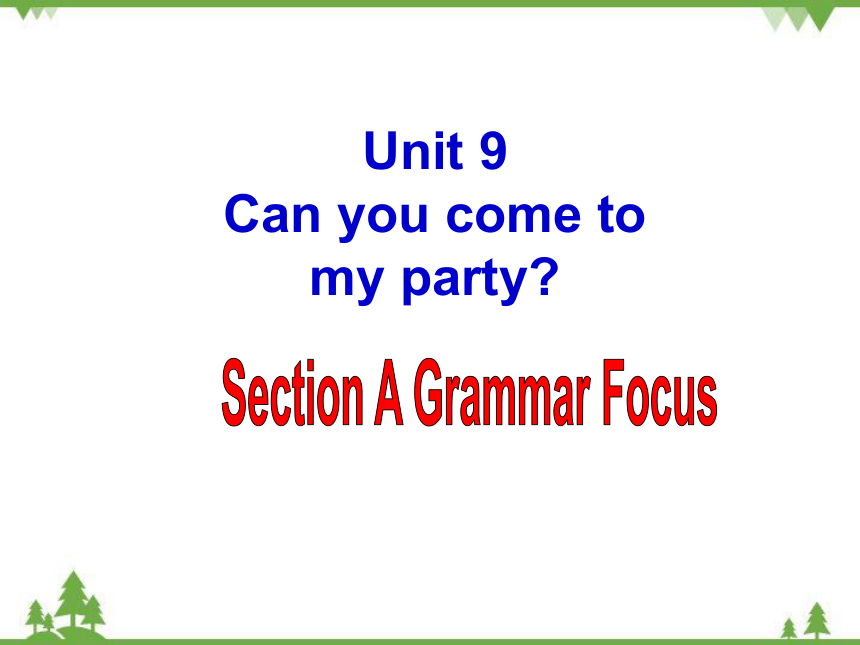 | |
| 格式 | ppt | ||
| 文件大小 | 1.8MB | ||
| 资源类型 | 教案 | ||
| 版本资源 | 人教新目标(Go for it)版 | ||
| 科目 | 英语 | ||
| 更新时间 | 2023-02-02 21:26:56 | ||
图片预览

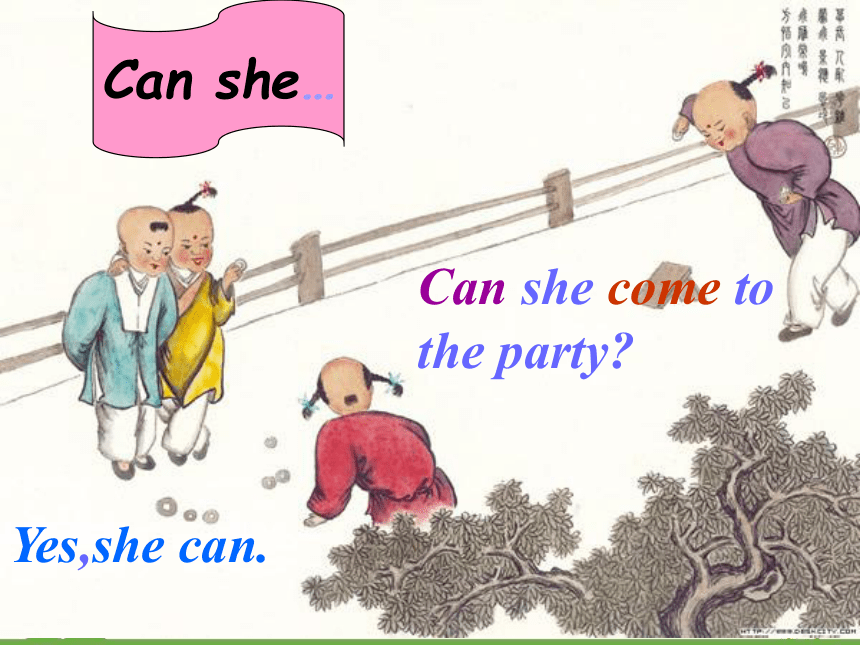
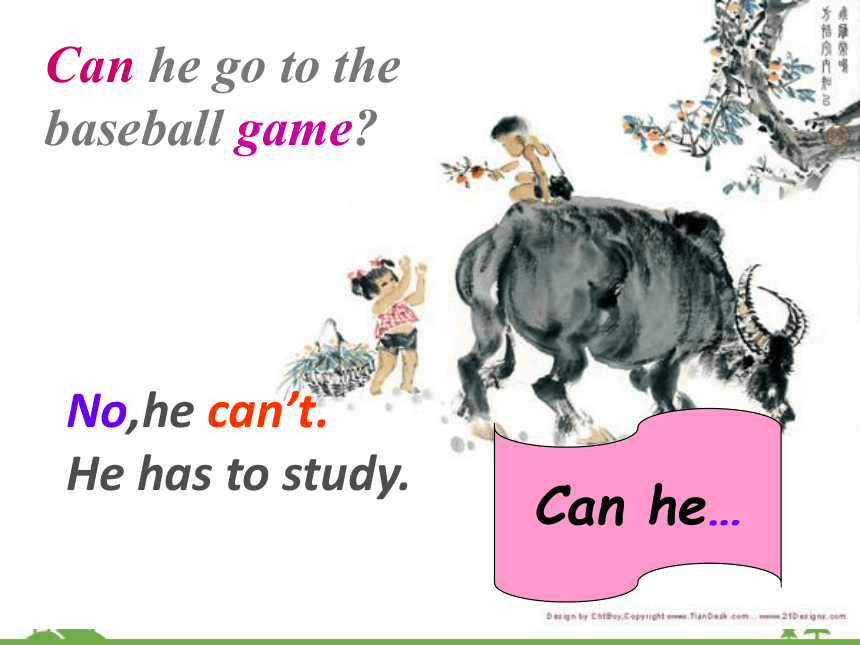
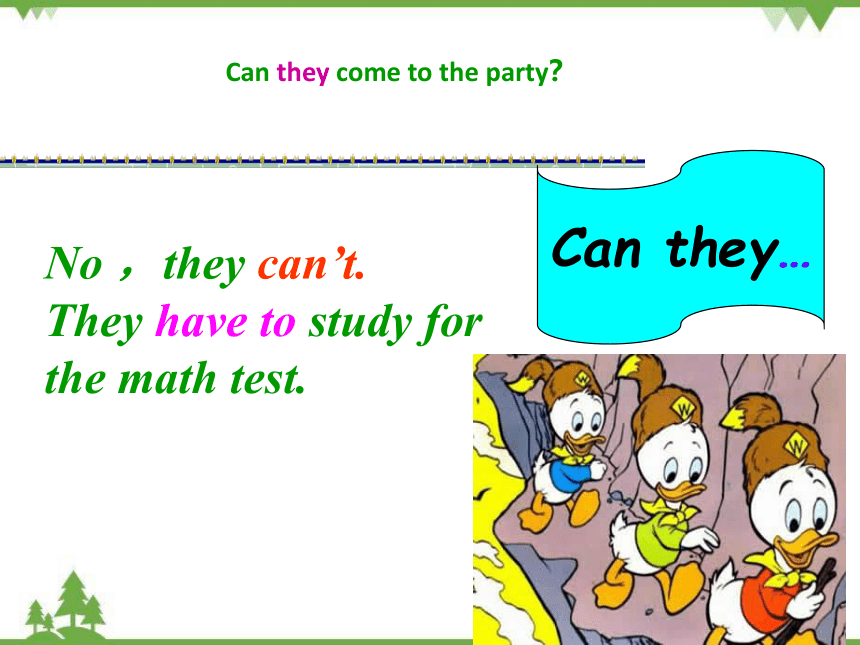
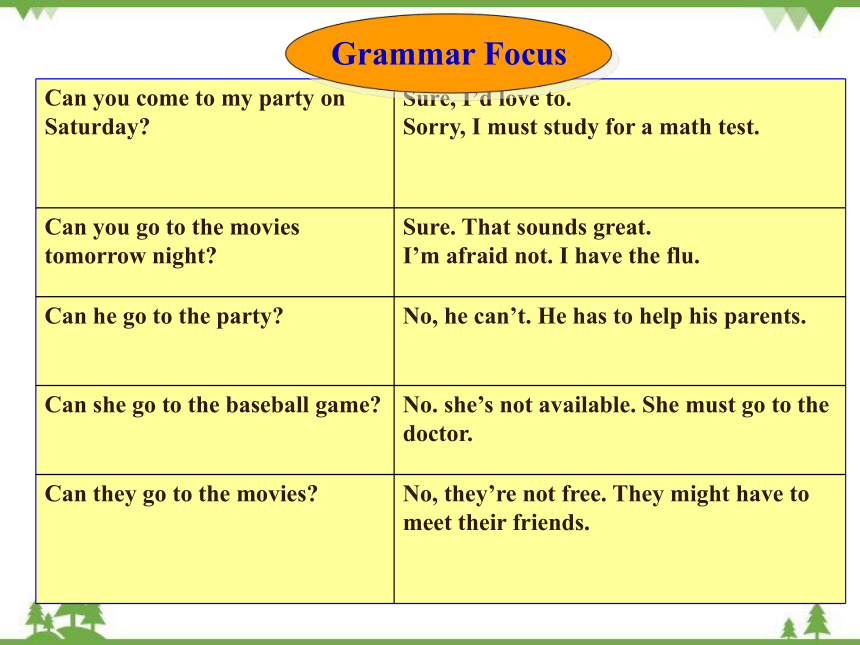
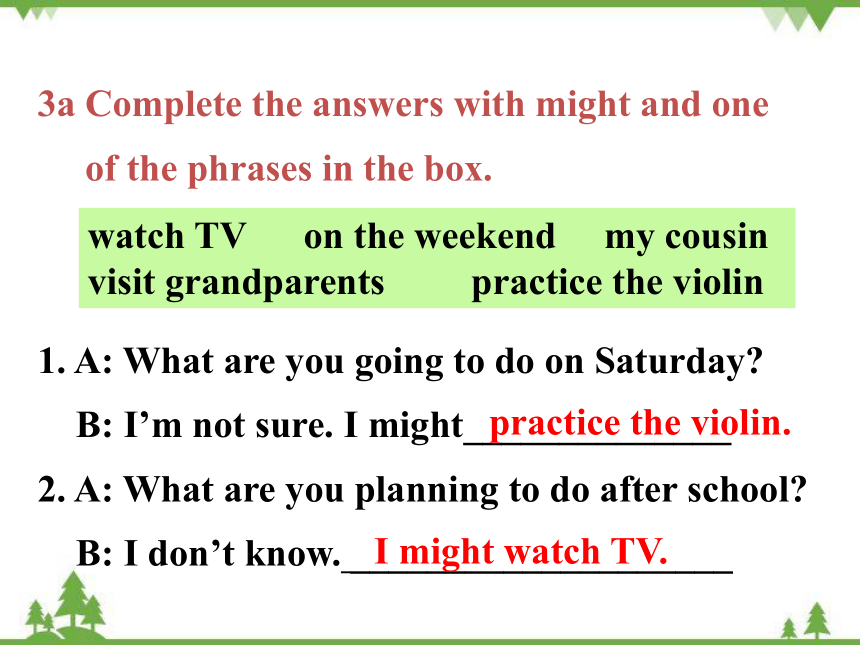
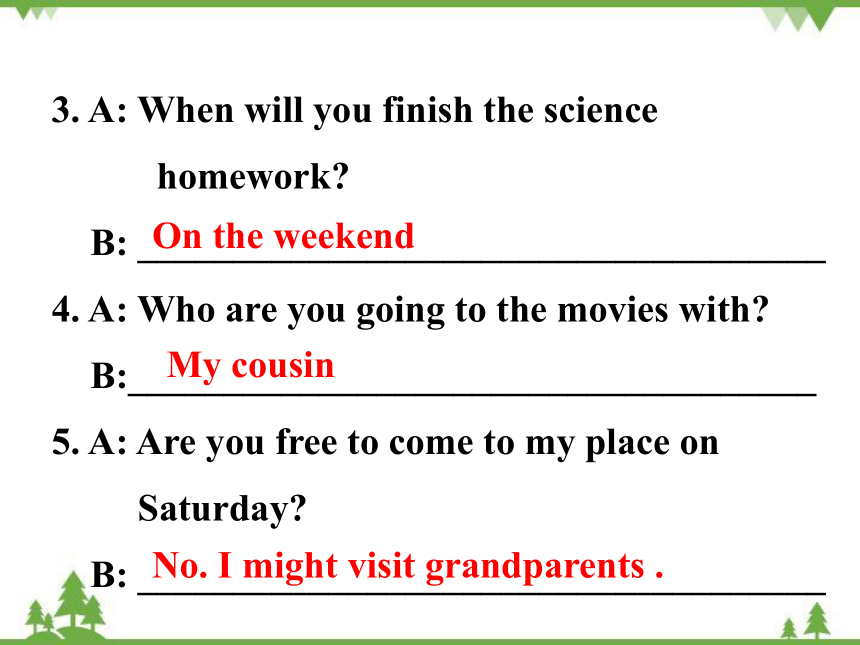
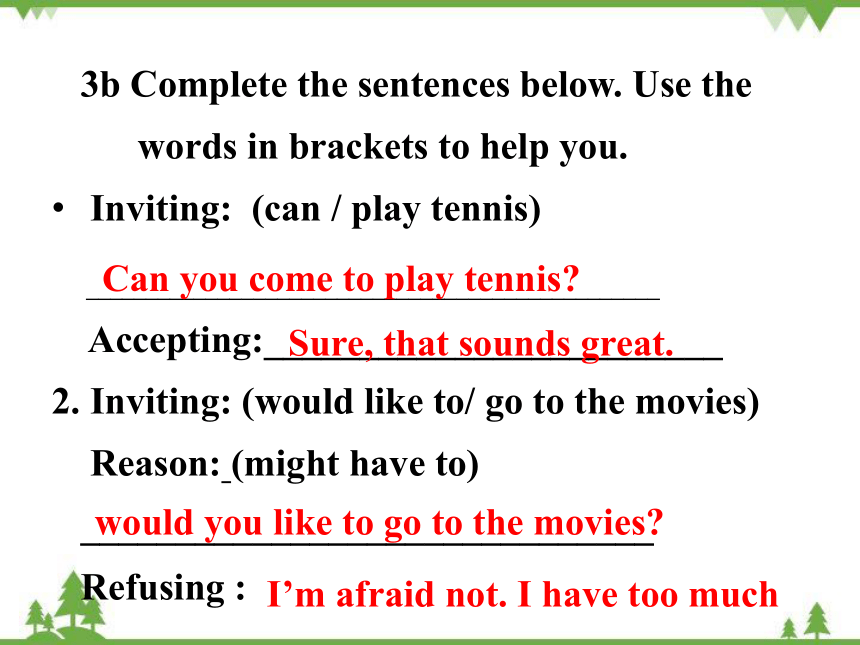

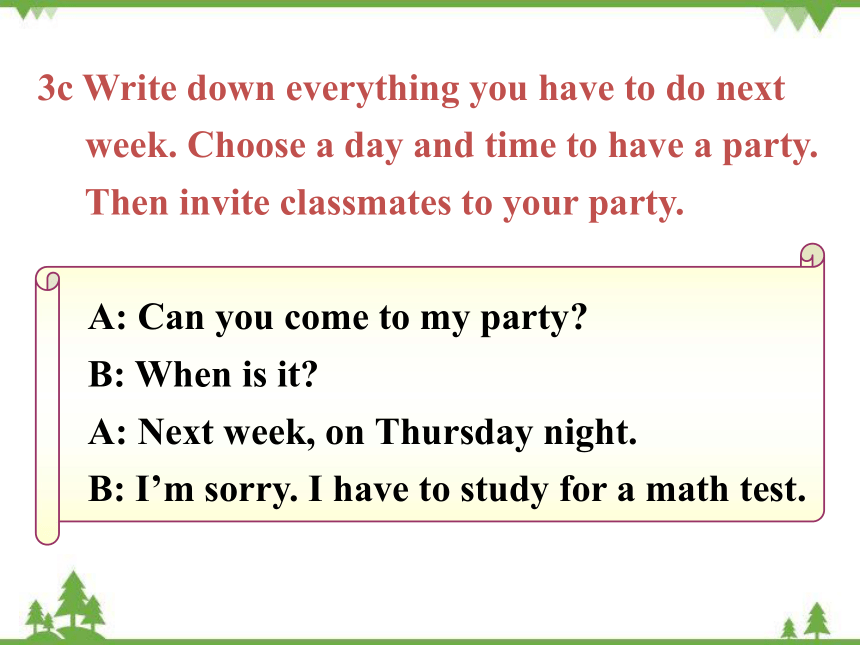
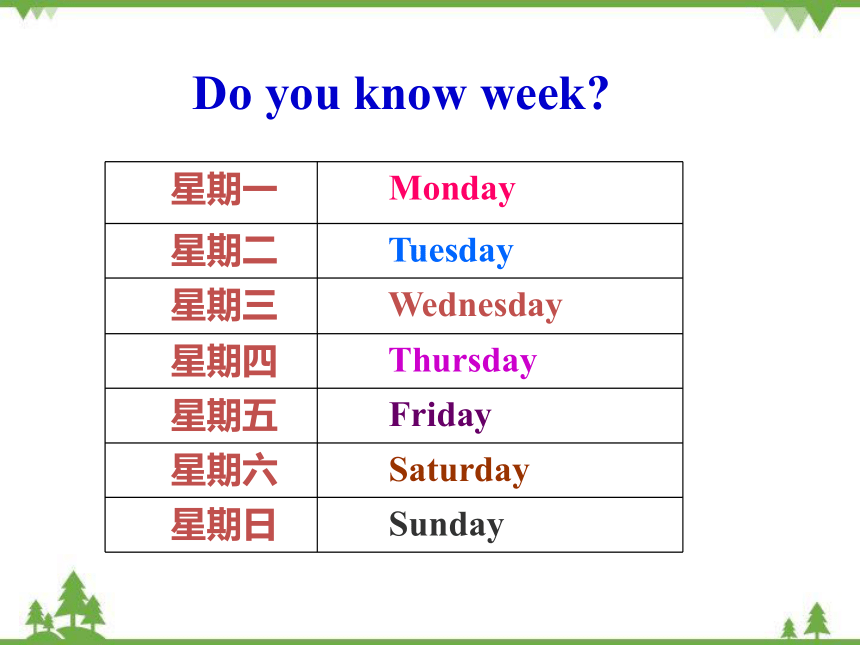
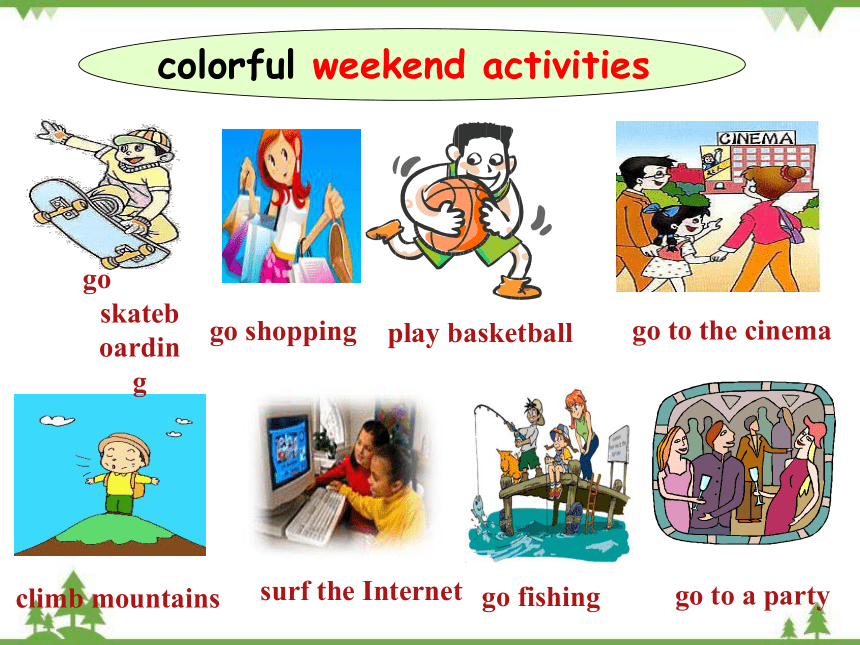
文档简介
(共51张PPT)
Unit 9 Can you come to my party
Yes,she can.
Can she come to the party
Can she…
No,he can’t.
He has to study.
Can he go to the baseball game
Can he…
Can they come to the party?
No ,they can’t. They have to study for the math test.
Can they…
Can you come to my party on Saturday Sure, I’d love to.
Sorry, I must study for a math test.
Can you go to the movies tomorrow night Sure. That sounds great.
I’m afraid not. I have the flu.
Can he go to the party No, he can’t. He has to help his parents.
Can she go to the baseball game No. she’s not available. She must go to the doctor.
Can they go to the movies No, they’re not free. They might have to meet their friends.
Grammar Focus
3a Complete the answers with might and one
of the phrases in the box.
1. A: What are you going to do on Saturday
B: I’m not sure. I might______________
2. A: What are you planning to do after school
B: I don’t know. ____________________
watch TV on the weekend my cousin visit grandparents practice the violin
practice the violin.
I might watch TV.
3. A: When will you finish the science
homework
B: ____________________________________
4. A: Who are you going to the movies with
B:____________________________________
5. A: Are you free to come to my place on
Saturday
B: ____________________________________
On the weekend
My cousin
No. I might visit grandparents .
3b Complete the sentences below. Use the
words in brackets to help you.
Inviting: (can / play tennis)
________________________________________________
Accepting:________________________ 2. Inviting: (would like to/ go to the movies)
Reason: (might have to)
______________________________
Refusing :
Can you come to play tennis
Sure, that sounds great.
would you like to go to the movies
I’m afraid not. I have too much
______________________________
3. Inviting: (can/hang out with us tonight)
Reason: (must)
____________________________________
Refusing: _____________________________
4. Inviting: ( would like to / come to my
birthday party)
______________________________________
Accepting:______________________________
homework to do.
Can you hang out with us tonight
Would you like to come to my birthday party
No, I can’t. I must finish my homework.
Sure, I’d love to.
3c Write down everything you have to do next
week. Choose a day and time to have a party.
Then invite classmates to your party.
A: Can you come to my party
B: When is it
A: Next week, on Thursday night.
B: I’m sorry. I have to study for a math test.
星期一 Monday
星期二 Tuesday
星期三 Wednesday
星期四 Thursday
星期五 Friday
星期六 Saturday
星期日 Sunday
Do you know week
colorful weekend activities
go fishing
go shopping
go skateboarding
play basketball
go to the cinema
climb mountains
surf the Internet
go to a party
go to the concert
study for a test
go to the doctor
have a piano lesson
visit his aunt
go to a baseball game/
have baseball training
Weekend Activities
What do you usually do on weekends
What activities do you do on weekends
have to … 不得不
A: What do you have to do this weekend B: I have to…
What weekend activities do you do
study for a test
go to the doctor
have a dancing lesson
情态动词主要有:may/might, can/could,
must, have to, shall/should, will/would,
ought to, need, dare, used to。
Grammar focus
现在我们来着重学习情态动词can 以及
have to 的用法。
其特征主要有:
1. 不能独立作谓语,只能和动词原形一起构成谓语,表示说话人的语气和情态。
2. 没有人称和数的变化。 (have to除外)
3. 否定形式:在其之后加not (have to除外)。
疑问形式:情态动词提到主语之前(have to 除外)。
can为情态动词, 在本单元中表示请求,
用于发出邀请,后跟动词原形。当同意接
受对方的邀请时, 常用Sure, I’d love to. /
Certainly. /Of course.等来回答;若不接受,
常用Sorry等来有礼貌地拒绝, 一般情况下
需要说明不能接受邀请的原因以表示歉意。
—Can you come to my birthday party
tomorrow?
明天你来参加我的生日聚会,好吗?
—Sorry, I can’t. I am going to visit my
grandpa.
很抱歉,我来不了,我要去看我爷爷。
1. can/may
都可表示“许可” 。may用于较正式、客气的场合,而can比较随便(口语)。
You may/can smoke here.
Borrowers may not take out of the
library more than two books at a time.
The policeman says you can’t park here.
(2) May/Can I/we… 表示征询对方许可。
Can you… 表示请求。
① — May I use your phone
— Yes, you may./Yes, please.
/No, you may not.
/No, you mustn’t.
/No, you’d better not.
/I’m afraid not.
/I’m sorry. I’d rather you didn’t.
② — Can I go out and play, Mum
—Yes/Certainly, you can. /No, you can’t.
③ — Can you help me with this bag
—With pleasure./Sorry, I can’t.
(3) 都可表示“可能性”
肯定句
Mr. Reed looks pale. He may be ill.
(事实上的可能).
Mr. Read is in poor health. He can be ill at any time. (逻辑、理论上的可能)
This news may be true. (=might/could)
(事实上的可能)
Wang Wei can be really stubborn.
(有时或偶然可能会)(=could)
否定句
This news may not be true.
(也许不, =might not )
This news can’t be true.
(不可能, =couldn’t)
疑问句
Can this news be true (=Could)
≠May this news be true
(4) can 还可表示“能力”、“能够”
—You can swim, can’t you
—No, I can’t.
I can’t promise anything, but I’ll do what I can.
Tickets can be bought from the Tourist Information Center.
2. might/could
分别为may和can的一般过去时,分别表示过去的“许可”、“可能”和“能力” 、“能够”等。
The children asked whether they could/might go for a swim.(过去许可)
I was afraid it might rain that afternoon.
(过去可能)
He asked if the news could be true.
(过去可能)(Can the news be true )
She said he could speak several languages. (过去能力)
I couldn’t find her telephone number.
(过去能够)
(2) 都可表示现在或将来的“可能性”。语气没有may肯定。
①—There’s someone at the door.
—It could/might(=may) be George. (肯定句)
/It couldn’t (=can’t) be George.(否定句)
/Could(=Can) it be George (疑问句)
② According to the radio it could/might/ may rain tomorrow.
③ Lightning could (=can) be dangerous.
(3) Might/Could I/we …
Could you …
表示更委婉、更客气的请求。
① —Might/Could I ask you one more question
—Yes, of course you may/might/can/ could.
② —Could you help me with these boxes
—Of course I can./With pleasure.
有时在陈述句中也表示更委婉、更客气的请求或邀请:
—I wonder if I could/might leave now.
—I don’t suppose you could/might.
3. can/be able to
can= am/is/are able to
= shall/will be able to
① No one can do it.
=No one is able to do it.
② Can you come tonight
=Will you be able to come tonight
(2) could 表示过去的技能、本能; was/ were able to 表示过去某一具体场合经过努力而做成某事。
① I could swim when I was six.
② He started late, but he was able to catch the eight o’clock train.
=…but he managed to catch …
=…but he succeeded in catching …
But:
③Mr. Smith couldn’t/wasn’t able to see you because he’s got a bad cold.
(3) be able to还有完成式和非谓语形式。
① I’m sorry I haven’t been able to answer your letter.
=I’m sorry for not being able to answer your letter.
② To be able to run is very important for a footballer.
4. have to的意思是“必须、不得不”, 往往
强调由于客观原因而必须做某事。
have to 后接动词原形;have to有人称、
数和时态的变化, 其第三人称单数形式为
has to, 其疑问形式和否定形式要借助于
助动词do或does来完成。例如:
We have to look after our sister at home.
我们不得不在家照顾我们的妹妹。
Does he have to get up early tomorrow
morning 明天早上他必须早起吗?
I don’t have to stay at home today.
今天我不必呆在家里。
情态动词“have to”与其他的情态动词
如“can”, “may” “must”和 “should”
不同。
1) 这4个情态动词没有人称的变化,
而have to有, 它的第三人称单数
为“has to” 如:
He should study hard.
He has to study hard.
2) 这4个情态动词在一般疑问句中将它们放
在句首, 在否定句中直接在他们后边加not即可。
我们以can为例:
--Can he go with us 他能和我们一起去吗?
--He can’t go with us. 他不能和我们一起去。
而“have to”要加助动词do , does或did才
可能完成其疑问句、否定句。
5. must/have to
must 表示主观“必须”;have to表示客观客观需要,即“不得不” 。
I don’t like this TV set. I must buy a new one.
This TV set doesn’t work. We have to buy a new one.
(now)
You must get up at five tomorrow.
We (will) have to get up early tomorrow —we’re going to Devon. (future)
I had to leave early because I wasn’t feeling well.
She said she must/had to see the manager.
(past)
表示邀请的句型: (你能来参加我的聚会吗 )
Can you come to my party
Could you come to my party
Would you like to come to my party
接受邀请:
拒绝邀请:
Sure, I’d love/like to.
I’m sorry, I can’t. I have to…
/I’m V-ing…
Exercise
一、选择正确的词
Thank you for (ask/ asking), but I can’t go to the movies with you.
Paul has to study (at/ for) the math test tonight.
My sister has too (much/ many) homework to do.
asking
for
much
4. Can you come to my party (at/ on) Saturday night
5. She invites me (watch/ to watch) the basketball match the day after tomorrow.
6. I like playing (piano/ the piano).
on
to watch
the piano
二. 对话填空。每空一词,单词的首字母已给出。
A: Hey, Xiao Wang, can you go to the
m_______ on Saturday
B: I’m s______, I can’t. I have too much
h_________ this weekend. And I’m not
f_____ ____ well today.
A: That’s too b____. What’s the matter
ovies
orry
omework
ad
eeling
B: I’m not sure. Maybe I have a c______, as
I’m feeling a little cold.
A: I think you’d b_____ go to the d_______.
B: I also t______ so.
A: Maybe I’m asking you to come another
time.
B: Sure. T______ for asking.
old
etter
octor
hink
hanks
三、选择题
1. Can you play tennis with on Saturday
A. us B. we C. our D. ours
2. Henry his homework this afternoon.
A. have to do B. have to doing
C. has to do D. has to doing
3. Tony is playing tennis the school team.
A. on B. in C. to D. with
4. Jim play soccer with his friend this
weekend, because he is very busy.
A. can B. cans C. cann’t D. can’t
A
C
B
D
5. -
-It’s October the 14th.
A. When is today B. what’s today
C. What time is today
D. What day is today
6. He is with his father the whole day.
A. fish B. fishes
C. to fish D. fishing
B
D
7. –Can you come to my party
- .
A: Sure, I love
B: Sure, I love to
C: Sure, I’d love to
D: Sure, I’d love.
C
8. ---Would you like to play football with us
---____________, but I’m busy.
A. No, I can’t B. No, I wouldn’t
C. Yes, I’m glad D. Yes, I’d love to
9. ---___________I take the newspaper away
---No, you mustn’t. You ______ read it only here.
A. Must; can B. May; can
C. Need; must D. Must; must
A
B
It’s a Birthday Party
Friday,June30,at four hirty
Lisa’s house ,15th Street
Come and have fun!
For whom :
Time :
Place :
Lisa
Homework
Write an invitation based on the following information.
Unit 9 Can you come to my party
Yes,she can.
Can she come to the party
Can she…
No,he can’t.
He has to study.
Can he go to the baseball game
Can he…
Can they come to the party?
No ,they can’t. They have to study for the math test.
Can they…
Can you come to my party on Saturday Sure, I’d love to.
Sorry, I must study for a math test.
Can you go to the movies tomorrow night Sure. That sounds great.
I’m afraid not. I have the flu.
Can he go to the party No, he can’t. He has to help his parents.
Can she go to the baseball game No. she’s not available. She must go to the doctor.
Can they go to the movies No, they’re not free. They might have to meet their friends.
Grammar Focus
3a Complete the answers with might and one
of the phrases in the box.
1. A: What are you going to do on Saturday
B: I’m not sure. I might______________
2. A: What are you planning to do after school
B: I don’t know. ____________________
watch TV on the weekend my cousin visit grandparents practice the violin
practice the violin.
I might watch TV.
3. A: When will you finish the science
homework
B: ____________________________________
4. A: Who are you going to the movies with
B:____________________________________
5. A: Are you free to come to my place on
Saturday
B: ____________________________________
On the weekend
My cousin
No. I might visit grandparents .
3b Complete the sentences below. Use the
words in brackets to help you.
Inviting: (can / play tennis)
________________________________________________
Accepting:________________________ 2. Inviting: (would like to/ go to the movies)
Reason: (might have to)
______________________________
Refusing :
Can you come to play tennis
Sure, that sounds great.
would you like to go to the movies
I’m afraid not. I have too much
______________________________
3. Inviting: (can/hang out with us tonight)
Reason: (must)
____________________________________
Refusing: _____________________________
4. Inviting: ( would like to / come to my
birthday party)
______________________________________
Accepting:______________________________
homework to do.
Can you hang out with us tonight
Would you like to come to my birthday party
No, I can’t. I must finish my homework.
Sure, I’d love to.
3c Write down everything you have to do next
week. Choose a day and time to have a party.
Then invite classmates to your party.
A: Can you come to my party
B: When is it
A: Next week, on Thursday night.
B: I’m sorry. I have to study for a math test.
星期一 Monday
星期二 Tuesday
星期三 Wednesday
星期四 Thursday
星期五 Friday
星期六 Saturday
星期日 Sunday
Do you know week
colorful weekend activities
go fishing
go shopping
go skateboarding
play basketball
go to the cinema
climb mountains
surf the Internet
go to a party
go to the concert
study for a test
go to the doctor
have a piano lesson
visit his aunt
go to a baseball game/
have baseball training
Weekend Activities
What do you usually do on weekends
What activities do you do on weekends
have to … 不得不
A: What do you have to do this weekend B: I have to…
What weekend activities do you do
study for a test
go to the doctor
have a dancing lesson
情态动词主要有:may/might, can/could,
must, have to, shall/should, will/would,
ought to, need, dare, used to。
Grammar focus
现在我们来着重学习情态动词can 以及
have to 的用法。
其特征主要有:
1. 不能独立作谓语,只能和动词原形一起构成谓语,表示说话人的语气和情态。
2. 没有人称和数的变化。 (have to除外)
3. 否定形式:在其之后加not (have to除外)。
疑问形式:情态动词提到主语之前(have to 除外)。
can为情态动词, 在本单元中表示请求,
用于发出邀请,后跟动词原形。当同意接
受对方的邀请时, 常用Sure, I’d love to. /
Certainly. /Of course.等来回答;若不接受,
常用Sorry等来有礼貌地拒绝, 一般情况下
需要说明不能接受邀请的原因以表示歉意。
—Can you come to my birthday party
tomorrow?
明天你来参加我的生日聚会,好吗?
—Sorry, I can’t. I am going to visit my
grandpa.
很抱歉,我来不了,我要去看我爷爷。
1. can/may
都可表示“许可” 。may用于较正式、客气的场合,而can比较随便(口语)。
You may/can smoke here.
Borrowers may not take out of the
library more than two books at a time.
The policeman says you can’t park here.
(2) May/Can I/we… 表示征询对方许可。
Can you… 表示请求。
① — May I use your phone
— Yes, you may./Yes, please.
/No, you may not.
/No, you mustn’t.
/No, you’d better not.
/I’m afraid not.
/I’m sorry. I’d rather you didn’t.
② — Can I go out and play, Mum
—Yes/Certainly, you can. /No, you can’t.
③ — Can you help me with this bag
—With pleasure./Sorry, I can’t.
(3) 都可表示“可能性”
肯定句
Mr. Reed looks pale. He may be ill.
(事实上的可能).
Mr. Read is in poor health. He can be ill at any time. (逻辑、理论上的可能)
This news may be true. (=might/could)
(事实上的可能)
Wang Wei can be really stubborn.
(有时或偶然可能会)(=could)
否定句
This news may not be true.
(也许不, =might not )
This news can’t be true.
(不可能, =couldn’t)
疑问句
Can this news be true (=Could)
≠May this news be true
(4) can 还可表示“能力”、“能够”
—You can swim, can’t you
—No, I can’t.
I can’t promise anything, but I’ll do what I can.
Tickets can be bought from the Tourist Information Center.
2. might/could
分别为may和can的一般过去时,分别表示过去的“许可”、“可能”和“能力” 、“能够”等。
The children asked whether they could/might go for a swim.(过去许可)
I was afraid it might rain that afternoon.
(过去可能)
He asked if the news could be true.
(过去可能)(Can the news be true )
She said he could speak several languages. (过去能力)
I couldn’t find her telephone number.
(过去能够)
(2) 都可表示现在或将来的“可能性”。语气没有may肯定。
①—There’s someone at the door.
—It could/might(=may) be George. (肯定句)
/It couldn’t (=can’t) be George.(否定句)
/Could(=Can) it be George (疑问句)
② According to the radio it could/might/ may rain tomorrow.
③ Lightning could (=can) be dangerous.
(3) Might/Could I/we …
Could you …
表示更委婉、更客气的请求。
① —Might/Could I ask you one more question
—Yes, of course you may/might/can/ could.
② —Could you help me with these boxes
—Of course I can./With pleasure.
有时在陈述句中也表示更委婉、更客气的请求或邀请:
—I wonder if I could/might leave now.
—I don’t suppose you could/might.
3. can/be able to
can= am/is/are able to
= shall/will be able to
① No one can do it.
=No one is able to do it.
② Can you come tonight
=Will you be able to come tonight
(2) could 表示过去的技能、本能; was/ were able to 表示过去某一具体场合经过努力而做成某事。
① I could swim when I was six.
② He started late, but he was able to catch the eight o’clock train.
=…but he managed to catch …
=…but he succeeded in catching …
But:
③Mr. Smith couldn’t/wasn’t able to see you because he’s got a bad cold.
(3) be able to还有完成式和非谓语形式。
① I’m sorry I haven’t been able to answer your letter.
=I’m sorry for not being able to answer your letter.
② To be able to run is very important for a footballer.
4. have to的意思是“必须、不得不”, 往往
强调由于客观原因而必须做某事。
have to 后接动词原形;have to有人称、
数和时态的变化, 其第三人称单数形式为
has to, 其疑问形式和否定形式要借助于
助动词do或does来完成。例如:
We have to look after our sister at home.
我们不得不在家照顾我们的妹妹。
Does he have to get up early tomorrow
morning 明天早上他必须早起吗?
I don’t have to stay at home today.
今天我不必呆在家里。
情态动词“have to”与其他的情态动词
如“can”, “may” “must”和 “should”
不同。
1) 这4个情态动词没有人称的变化,
而have to有, 它的第三人称单数
为“has to” 如:
He should study hard.
He has to study hard.
2) 这4个情态动词在一般疑问句中将它们放
在句首, 在否定句中直接在他们后边加not即可。
我们以can为例:
--Can he go with us 他能和我们一起去吗?
--He can’t go with us. 他不能和我们一起去。
而“have to”要加助动词do , does或did才
可能完成其疑问句、否定句。
5. must/have to
must 表示主观“必须”;have to表示客观客观需要,即“不得不” 。
I don’t like this TV set. I must buy a new one.
This TV set doesn’t work. We have to buy a new one.
(now)
You must get up at five tomorrow.
We (will) have to get up early tomorrow —we’re going to Devon. (future)
I had to leave early because I wasn’t feeling well.
She said she must/had to see the manager.
(past)
表示邀请的句型: (你能来参加我的聚会吗 )
Can you come to my party
Could you come to my party
Would you like to come to my party
接受邀请:
拒绝邀请:
Sure, I’d love/like to.
I’m sorry, I can’t. I have to…
/I’m V-ing…
Exercise
一、选择正确的词
Thank you for (ask/ asking), but I can’t go to the movies with you.
Paul has to study (at/ for) the math test tonight.
My sister has too (much/ many) homework to do.
asking
for
much
4. Can you come to my party (at/ on) Saturday night
5. She invites me (watch/ to watch) the basketball match the day after tomorrow.
6. I like playing (piano/ the piano).
on
to watch
the piano
二. 对话填空。每空一词,单词的首字母已给出。
A: Hey, Xiao Wang, can you go to the
m_______ on Saturday
B: I’m s______, I can’t. I have too much
h_________ this weekend. And I’m not
f_____ ____ well today.
A: That’s too b____. What’s the matter
ovies
orry
omework
ad
eeling
B: I’m not sure. Maybe I have a c______, as
I’m feeling a little cold.
A: I think you’d b_____ go to the d_______.
B: I also t______ so.
A: Maybe I’m asking you to come another
time.
B: Sure. T______ for asking.
old
etter
octor
hink
hanks
三、选择题
1. Can you play tennis with on Saturday
A. us B. we C. our D. ours
2. Henry his homework this afternoon.
A. have to do B. have to doing
C. has to do D. has to doing
3. Tony is playing tennis the school team.
A. on B. in C. to D. with
4. Jim play soccer with his friend this
weekend, because he is very busy.
A. can B. cans C. cann’t D. can’t
A
C
B
D
5. -
-It’s October the 14th.
A. When is today B. what’s today
C. What time is today
D. What day is today
6. He is with his father the whole day.
A. fish B. fishes
C. to fish D. fishing
B
D
7. –Can you come to my party
- .
A: Sure, I love
B: Sure, I love to
C: Sure, I’d love to
D: Sure, I’d love.
C
8. ---Would you like to play football with us
---____________, but I’m busy.
A. No, I can’t B. No, I wouldn’t
C. Yes, I’m glad D. Yes, I’d love to
9. ---___________I take the newspaper away
---No, you mustn’t. You ______ read it only here.
A. Must; can B. May; can
C. Need; must D. Must; must
A
B
It’s a Birthday Party
Friday,June30,at four hirty
Lisa’s house ,15th Street
Come and have fun!
For whom :
Time :
Place :
Lisa
Homework
Write an invitation based on the following information.
同课章节目录
- Unit 1 Where did you go on vacation?
- Section A
- Section B
- Unit 2 How often do you exercise?
- Section A
- Section B
- Unit 3 I'm more outgoing than my sister.
- Section A
- Section B
- Unit 4 What's the best movie theater?
- Section A
- Section B
- Unit 5 Do you want to watch a game show?
- Section A
- Section B
- Unit 6 I'm going to study computer science.
- Section A
- Section B
- Unit 7 Will people have robots?
- Section A
- Section B
- Unit 8 How do you make a banana milk shake?
- Section A
- Section B
- Unit 9 Can you come to my party?
- Section A
- Section B
- Unit 10 If you go to the party, you'll have a grea
- Section A
- Section B
